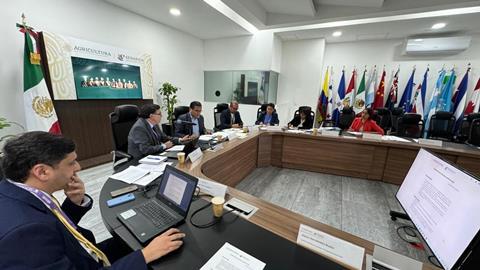Fruit growers now going for Systems Approach for shipments of grapes and kiwifruit to Mexico
Just days after having secured a Systems Approach for table grape exports to the US, Chile is turning its sights on improving access to the Mexican market.

The Agricultural and Livestock Service (SAG) and Frutas de Chile said they have held several positive meetings with Mexican phytosanitary authority Senasica to discuss the opening of the Mexican market for Chilean oranges, along with the implementation of the Systems Approach mechanism for table grape and kiwifruit exports, and the initiation of sea/land shipments of cherries and other Chilean fruits from Mexico to China.
The Systems Approach replaces the need for fumigation with methyl bromide with monitoring and inspections at source.
Marco Muñoz, head of SAG’s Agricultural, Forestry and Seeds Division, said progress had been made on a range of issues of mutual interest. “We presented the proposal for the implementation of the Systems Approach for shipments of our table grapes from the regions of Atacama, Coquimbo and Valparaíso, which is being favourably analysed, so we hope to be able to carry it out next season,” he said.
Muñoz noted that the positive reception from Senasica was partly due to the recent approval of the Systems Approach for shipments of Chilean grapes to US, which provides greater confidence regarding control and inspection processes.
In kiwifruit, a project piloting exports under a Systems Approach is due to begin in 2024/25 with a limited number of exporters.
According to Miguel Canala-Echeverría, general manager of Frutas de Chile, Chile has exported 40,000 tonnes of fresh fruit to Mexico so far in 2023/24. Table grape shipments, which accounted for approximately one-third of the total, were up 23 per cent on last season.
Canala-Echeverría said this was partly due to adverse climatic conditions hitting competing suppliers like Peru, but also the result of a successful Systems Approach pilot programme for shipments of grapes from Coquimbo to Mexico implemented in the first quarter of 2024.
“That is why, currently, together with SAG and Senasica, we are working to make the Systems Approach for our shipments of table grapes a reality from next season for producers and exporters in the regions of Atacama, Coquimbo and Valparaíso, the same regions that are today approved by the USDA-Aphis for shipments to the US,” he said.
“Moving to the Systems Approach means we are more competitive against countries that do not fumigate, since we can improve the condition and quality of our grapes, while contributing to promoting sustainability within the industry,” he said.
Exports of kiwifruit, which accounted for 13 per cent of Chile’s fruit shipments to Mexico, grew 7 per cent compared with the same period last season.
Chile is now pushing for a Systems Approach-based access to the Mexican market for orange exports.Mandarins and clementines are already permitted to enter the market without fumigation.
For its part, Mexico is looking to boost avocado exports to Chile, as well as shipments of irradiated mangoes from fruit fly-free areas.
The Chilean industry also held meetings with authorities at the Guadalajara International Airport, specifically with the GWTC company that manages the cargo transfer area, to discuss using Mexico as a transshipment hub for exports of Chilean cherries to China.
Guadalajara has become one of the main air cargo transportation hubs in Mexico, with daily flights from several airlines to Asia and other destinations. The Chilean authorities are due to sign a protocol with Chinese Customs later this year, giving exporters a new route to the Chinese market.



